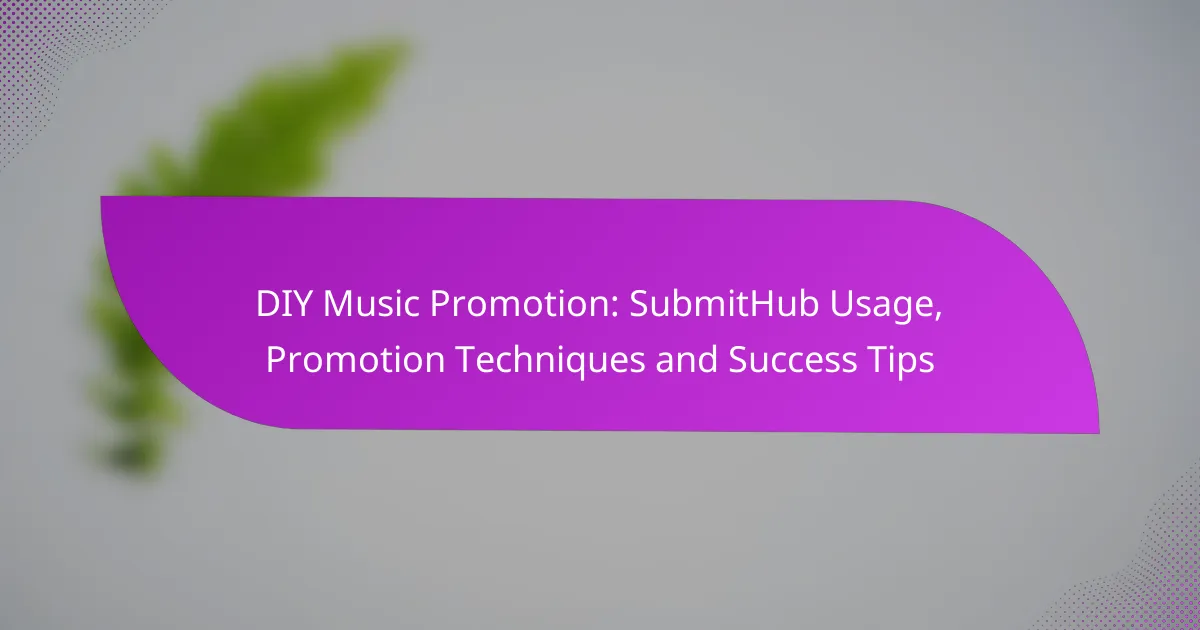SubmitHub is a powerful tool for musicians looking to promote their music by connecting with bloggers, playlist curators, and influencers. By leveraging effective promotion techniques and measuring success through key metrics, artists can enhance their visibility, engage with listeners, and build a dedicated fan base.
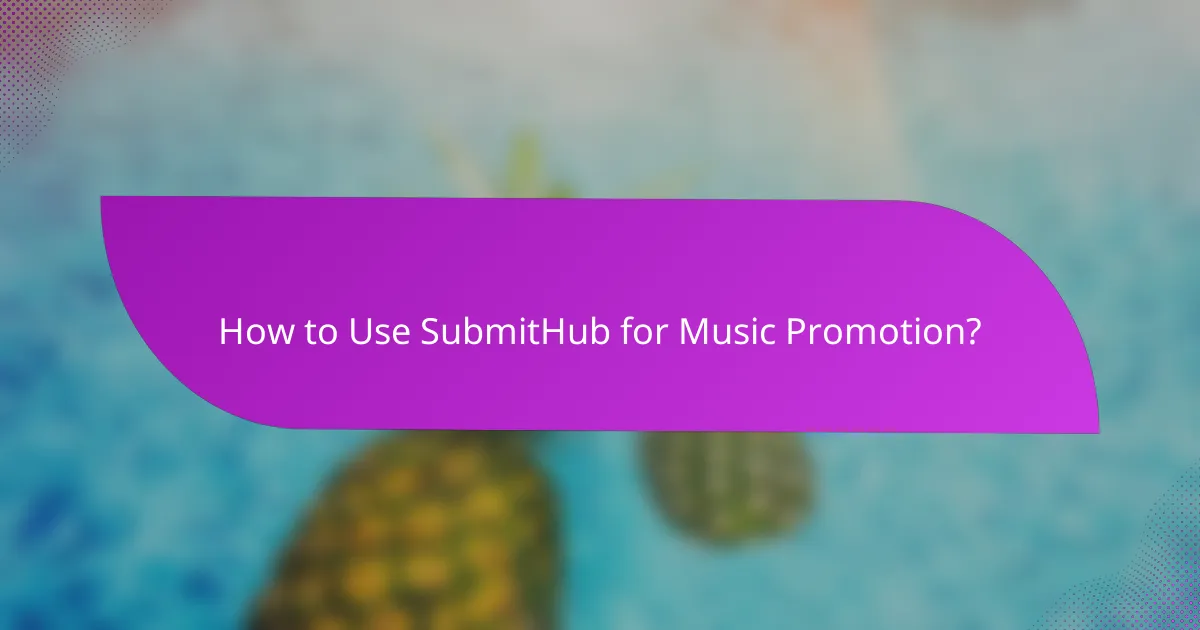
How to Use SubmitHub for Music Promotion?
SubmitHub is a platform that allows musicians to promote their music by submitting tracks to bloggers, playlist curators, and influencers. By effectively using SubmitHub, artists can increase their reach and gain valuable feedback on their music.
SubmitHub overview
SubmitHub connects musicians with curators who can help promote their music. Artists can submit their tracks to various curators across genres, increasing the chances of getting featured on playlists or blogs. The platform operates on a credit system, where users purchase credits to submit their music.
Creating an account
To start using SubmitHub, you need to create an account on their website. Registration is straightforward and requires basic information such as your email address and a password. Once your account is set up, you can purchase credits to begin submitting your music.
Submitting music tracks
After creating an account, you can submit your music tracks by selecting the desired curators and attaching your audio files. Each submission requires credits, which vary depending on the curator’s popularity and reach. Make sure your tracks are well-mixed and mastered to increase your chances of acceptance.
Choosing the right curators
Selecting the right curators is crucial for effective promotion. Use SubmitHub’s filtering options to find curators that align with your music genre and style. Review their submission guidelines and previous features to ensure your music fits their audience.
Tracking submission results
SubmitHub provides a dashboard where you can track the status of your submissions. You can see whether curators have listened to your track, provided feedback, or added it to their playlists. Regularly monitoring these results helps you understand what works and refine your future submissions.
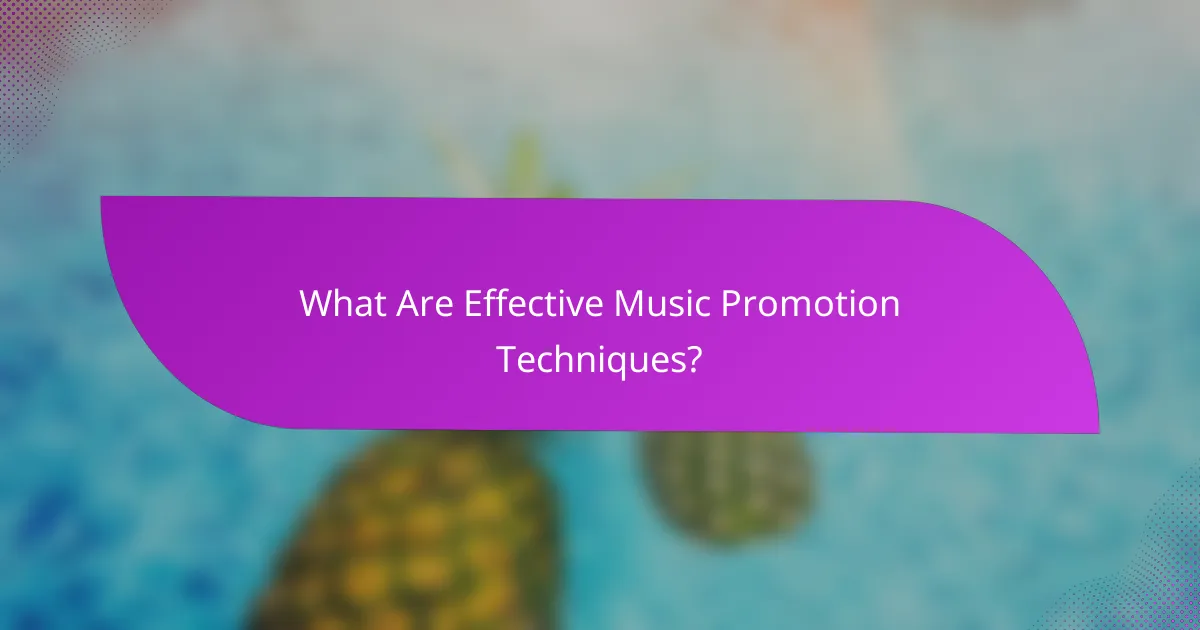
What Are Effective Music Promotion Techniques?
Effective music promotion techniques involve strategic methods to increase visibility and engagement for your music. These techniques can help you reach a wider audience and build a loyal fan base.
Social media strategies
Social media is a powerful tool for music promotion, allowing artists to connect directly with fans. Platforms like Instagram, TikTok, and Facebook can be used to share updates, behind-the-scenes content, and snippets of new music.
Engagement is key; respond to comments, host live sessions, and create shareable content to encourage followers to spread the word. Consider using targeted ads to reach specific demographics, which can be particularly effective for promoting new releases or events.
Email marketing campaigns
Email marketing remains one of the most effective ways to reach fans directly. Building an email list allows you to send personalized updates about new music, concerts, and exclusive content.
Use compelling subject lines and clear calls to action to increase open rates. Regular newsletters can keep your audience engaged, but be mindful not to overwhelm them with too many emails; a monthly update is often sufficient.
Collaborations with influencers
Collaborating with influencers can significantly boost your music’s reach. Influencers often have established audiences that trust their recommendations, making them valuable partners for promoting your work.
Choose influencers whose style aligns with your music for authenticity. Consider offering them exclusive content or early access to your tracks in exchange for promotion, which can create a win-win situation.
Utilizing music blogs
Music blogs are an excellent avenue for gaining exposure and credibility. Submitting your music to blogs can lead to reviews, features, and interviews that introduce you to new listeners.
Research blogs that cater to your genre and follow their submission guidelines closely. Building relationships with bloggers can also lead to ongoing support, so engage with their content and show appreciation for their work.
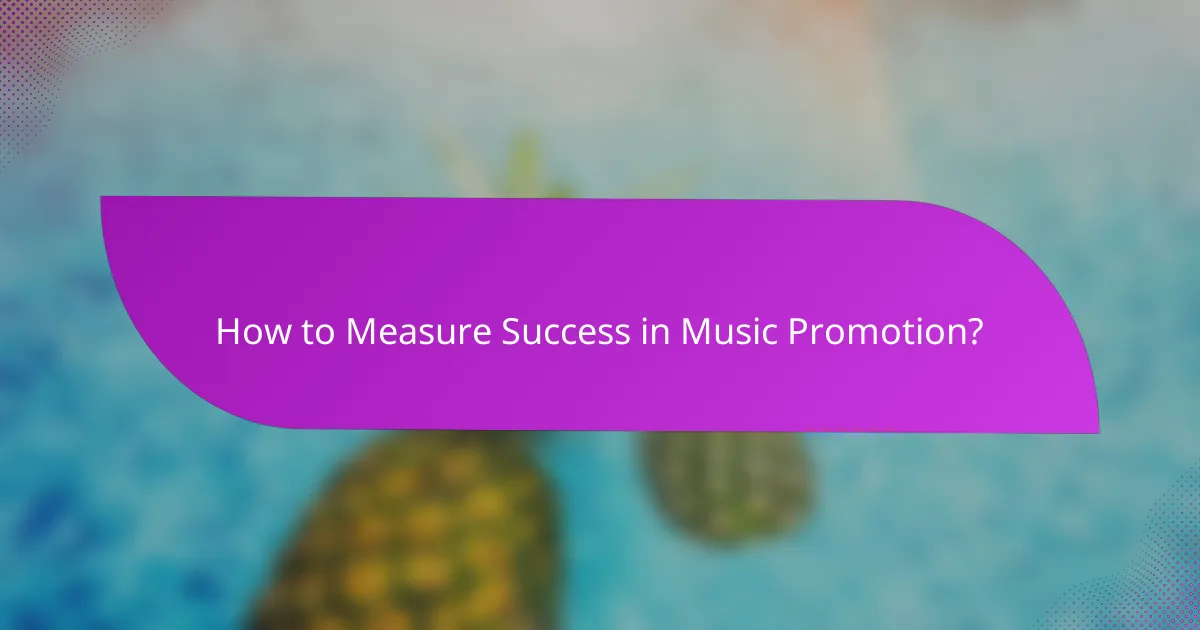
How to Measure Success in Music Promotion?
Measuring success in music promotion involves tracking various metrics that indicate how well your music is performing and resonating with audiences. Key areas to focus on include listener engagement, sales, and streaming metrics, which provide insights into your promotional effectiveness.
Key performance indicators
Key performance indicators (KPIs) are essential for evaluating the success of your music promotion efforts. Common KPIs include the number of streams, downloads, and social media interactions. Setting specific goals for these metrics can help you gauge progress over time.
For instance, if you aim for a 20% increase in streams over a quarter, you can adjust your strategies based on the results. Regularly reviewing these indicators allows you to identify what works and what needs improvement.
Analyzing listener engagement
Listener engagement is a critical component of measuring success in music promotion. This can be assessed through metrics like average listening time, playlist adds, and comments on social media. High engagement often indicates that your audience is connecting with your music.
To enhance listener engagement, consider interacting with your audience through live Q&A sessions or social media polls. These activities can foster a sense of community and encourage more active participation from fans.
Sales and streaming metrics
Sales and streaming metrics provide concrete data on how your music is performing commercially. Tracking sales figures, both digital and physical, alongside streaming numbers from platforms like Spotify and Apple Music, helps you understand your financial success.
For example, if you notice a spike in sales following a promotional campaign, it may indicate that your efforts were effective. Conversely, if streaming numbers are low, it may be time to reassess your marketing strategies and explore new promotional avenues.
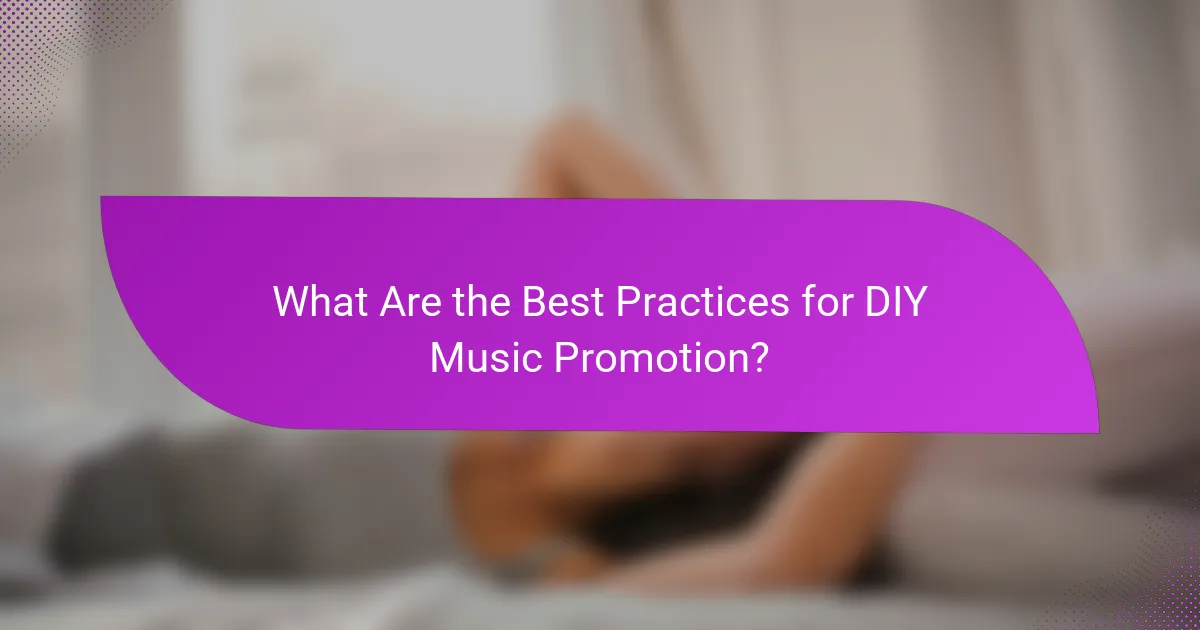
What Are the Best Practices for DIY Music Promotion?
Effective DIY music promotion involves strategic planning, consistent engagement, and leveraging various online tools. By focusing on building an online presence, networking with industry professionals, and creating a promotional calendar, musicians can significantly enhance their visibility and reach.
Building an online presence
Establishing a strong online presence is crucial for DIY music promotion. This includes creating profiles on social media platforms like Instagram, Facebook, and TikTok, as well as maintaining an updated website or blog. Regularly posting content that showcases your music, behind-the-scenes moments, and personal stories can help engage your audience.
Utilize streaming platforms such as Spotify and SoundCloud to share your music widely. Consider using tools like SubmitHub to submit your tracks to blogs, playlists, and influencers, which can further increase your exposure. Consistency in branding and messaging across all platforms is key to building a recognizable identity.
Networking with industry professionals
Networking with industry professionals can open doors to valuable opportunities in music promotion. Attend local music events, festivals, and workshops to meet producers, promoters, and other artists. Building genuine relationships can lead to collaborations and increased visibility.
Online networking is equally important. Join music forums, Facebook groups, and LinkedIn to connect with industry insiders. Engaging in discussions and sharing your insights can help you establish credibility and attract attention from potential collaborators or promoters.
Creating a promotional calendar
A promotional calendar helps organize your marketing efforts and ensures consistent engagement with your audience. Start by mapping out key dates, such as release dates, performances, and promotional campaigns. This allows you to plan content in advance and maintain a steady flow of communication.
Include various promotional activities in your calendar, such as social media posts, email newsletters, and collaborations. Regularly review and adjust your calendar based on feedback and engagement metrics to optimize your promotional strategies. Aim for a balanced approach that combines different types of content to keep your audience engaged.
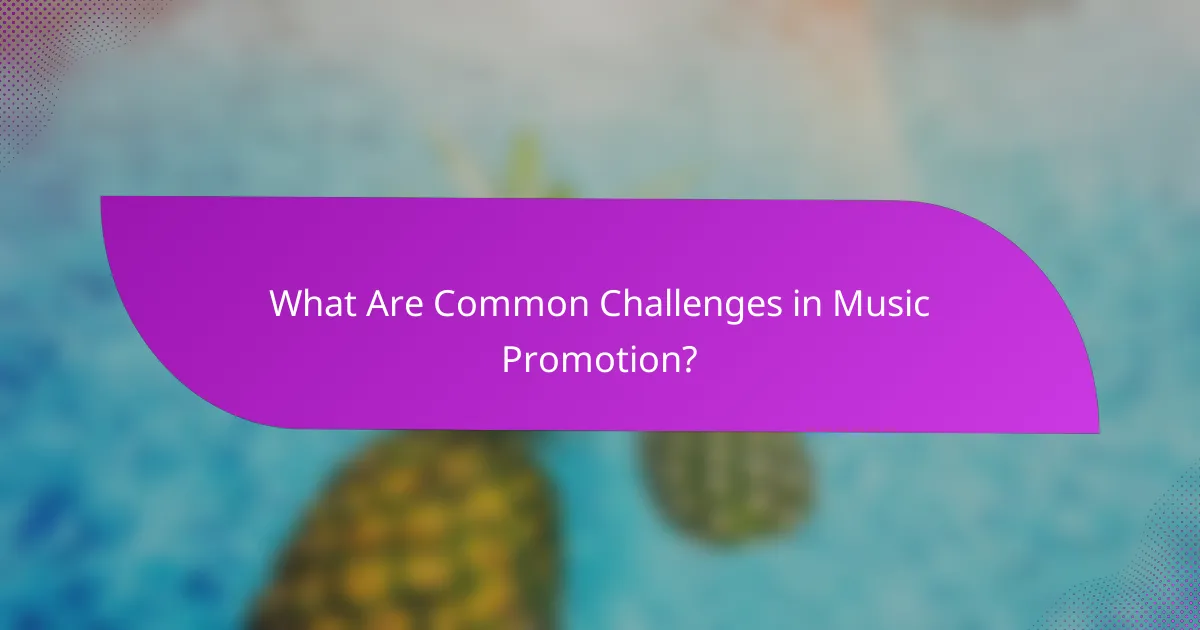
What Are Common Challenges in Music Promotion?
Music promotion often faces several challenges that can hinder an artist’s reach and success. Key obstacles include budget constraints, competition in a crowded market, and the need for effective strategies to engage audiences.
Budget constraints
Budget constraints are a significant challenge in music promotion, affecting how much an artist can invest in marketing efforts. Many independent musicians operate on tight budgets, making it essential to prioritize spending on the most effective promotional channels.
To manage budget constraints, consider focusing on low-cost or free promotional strategies, such as social media marketing, email newsletters, and collaborations with other artists. Allocating funds wisely can also mean investing in targeted ads or platforms like SubmitHub, which can yield better engagement for a reasonable cost.
Establish a clear budget plan that outlines your promotional goals and the resources needed. Regularly assess the effectiveness of your spending to ensure you are getting the best return on investment, whether it’s through increased streams, social media followers, or concert attendance.
